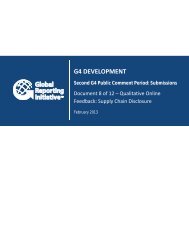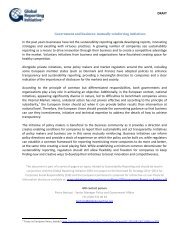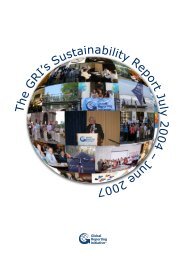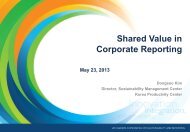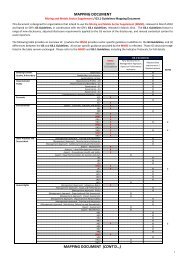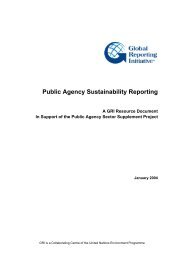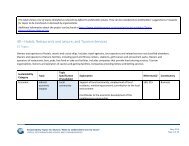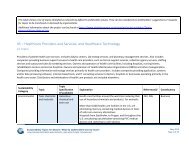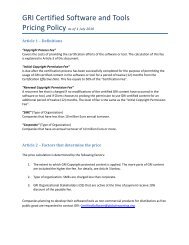CARROTS AND STICKS – PROMOTING ... - Global Reporting Initiative
CARROTS AND STICKS – PROMOTING ... - Global Reporting Initiative
CARROTS AND STICKS – PROMOTING ... - Global Reporting Initiative
You also want an ePaper? Increase the reach of your titles
YUMPU automatically turns print PDFs into web optimized ePapers that Google loves.
“The vision of the Danish<br />
Government’s Action Plan on<br />
Corporate Social Responsibility<br />
is to make the Danish corporate<br />
sector internationally renowned<br />
for responsible growth. A large<br />
number of Danish businesses<br />
work determinedly on corporate<br />
social responsibility, but far too<br />
few businesses release systematic<br />
information about their initiatives.<br />
And then it is difficult for them to<br />
gain recognition for their work. So<br />
some businesses need to be better<br />
at communicating about their<br />
initiatives. Reliable communication<br />
and transparency play a key role<br />
for the businesses to reap the full<br />
benefits of their initiatives because<br />
customers, consumers, employees,<br />
investors, etc. request such<br />
communication and transparency.<br />
The government’s message is<br />
clear: the new government rules on<br />
how large businesses must report<br />
on corporate social responsibility<br />
can play an important role. We in<br />
Denmark welcome the rest of the<br />
world to a dialogue on our new<br />
law.”<br />
Carsten Ingerslev, Head of the Danish Centre<br />
for CSR, Danish Commerce and Companies<br />
Agency, Member of the GRI Governmental<br />
Advisory Group<br />
The analysis of legislation and<br />
mandatory and voluntary standards,<br />
codes and guidelines revealed the<br />
following key findings:<br />
Governments take the lead<br />
Compared to four years ago, more<br />
governments have started to make<br />
sustainability reporting mandatory.<br />
Of the more than 140 national<br />
standards identified, approximately<br />
two thirds are mandatory. Examples<br />
are Sweden’s Guidelines for external<br />
reporting by state-owned companies<br />
complementing accounting legislation<br />
and generally accepted accounting<br />
principles and Denmark’s revised<br />
Financial Statements Act, requiring<br />
CSR disclosure for large companies.<br />
This development may form part of<br />
growing interest in ‘new regulation’,<br />
variants of ‘smart regulation’ that takes<br />
a more collaborative approach and<br />
requires improved sharing of relevant<br />
information so that regulations can<br />
reflect change and promote continual<br />
improvement, amongst others based<br />
on ongoing stakeholder feedback and<br />
disclosure of performance information.<br />
In 2007 Sweden’s Ministry<br />
of Enterprise, Energy and<br />
Communications issued Guidelines<br />
for external reporting by state-owned<br />
companies. According to these<br />
guidelines, which took effect in<br />
2008, the state-owned companies<br />
are to present a sustainability report<br />
in accordance with the <strong>Global</strong><br />
<strong>Reporting</strong> <strong>Initiative</strong>’s (GRI) guidelines.<br />
Sustainability reports are to be quality<br />
assured by being independently<br />
checked and are to be published in<br />
time for the Annual General Meeting<br />
at the same time as the annual report.<br />
This action has resulted in a significant<br />
increase in sustainability reporting from<br />
Sweden’s state-owned companies.<br />
The requirement was for companies<br />
to report or explain why they could<br />
not, resulting in more than 89% of<br />
Swedish state-owned companies<br />
having issued GRI reports.<br />
In 2009 the Danish Government<br />
expanded the requirements in the<br />
Danish Financial Statements Act<br />
requiring reporting on environment<br />
and intellectual capital in the<br />
management’s review to also include<br />
CSR reporting in general. About 1,100<br />
of the largest businesses, listed<br />
companies and state-owned public<br />
limited companies are required to<br />
report on corporate social responsibility<br />
in their annual reports, or explain why<br />
they refrain from such reporting. 9<br />
The revised Act entered into force on<br />
1 January 2009 and applies to financial<br />
years beginning on 1 January 2009 or<br />
later.<br />
But governments have also become<br />
more active in issuing voluntary<br />
guidelines for sustainability or<br />
environmental reporting. They are<br />
designed to assist companies and/or<br />
public agencies themselves. Examples<br />
are the Voluntary CSR Guidelines,<br />
2009 issued by the Indian Ministry<br />
of Corporate Affairs. In December<br />
2009 India’s Ministry of Corporate<br />
9 Danish companies that are members of the UN <strong>Global</strong> Compact<br />
and issue COPs are exempt from reporting.<br />
Carrots and Sticks - Promoting Transparency and Sustainability<br />
Affairs launched voluntary guidelines<br />
for responsible business which aim<br />
to add value to the operations and<br />
contribute towards the long term<br />
sustainability of the business. These<br />
guidelines also aim to enable business<br />
to focus as well as contribute towards<br />
the interests of the stakeholders and<br />
the society. Pursuant to the guidelines<br />
the companies should disseminate<br />
information on CSR policy, activities<br />
and progress in a structured manner to<br />
all their stakeholders and the public at<br />
large through their annual reports, their<br />
website and other communication<br />
media. Another example is the<br />
Environmental <strong>Reporting</strong> Guidelines,<br />
2007 issued by the Japanese Ministry<br />
of the Environment.<br />
Interestingly, many of the voluntary<br />
standards identified at the national<br />
level were issued by governments<br />
(Government Ministries). Often<br />
governments prefer to use “soft<br />
power” (Hohnen, 2007) first before<br />
they legislate. Moreover, they aim<br />
to provide guidance to companies<br />
without having to pass through a<br />
cumbersome parliamentary procedure.<br />
Soft “measures” often pave the way<br />
for harder measures, e.g. legislation.<br />
In this sense, voluntary standards are<br />
not only complementary, but they<br />
can also have a pre-law function.<br />
The review of standards, codes and<br />
guidelines in chapter five revealed<br />
almost 50 voluntary standards, codes<br />
and guidelines of different types. Not<br />
only governments issue voluntary<br />
guidelines: a substantive part of<br />
these instruments are issued by nongovernmental<br />
entities, for example<br />
industry associations or other private<br />
institutions. Examples include the<br />
RSE.COOP <strong>Reporting</strong> Guidelines<br />
Programme, 2006 issued by CEPES,<br />
a Spanish Enterprise Confederation,<br />
the guidelines for social reporting in<br />
the financial sector published by the<br />
Italian Banking Association and the<br />
European Institute for Social <strong>Reporting</strong>,<br />
or the King Code of Governance for<br />
South Africa (King III), 2009, issued by<br />
the Institute of Directors in Southern<br />
Africa.<br />
13





